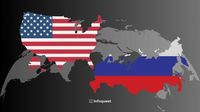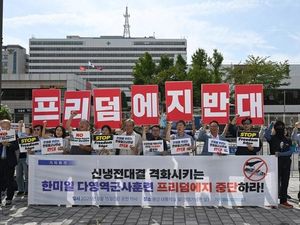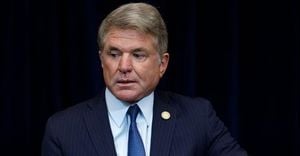The recent shift in U.S. security policy towards Russia has sparked significant concerns regarding international relations and ongoing efforts to counter hybrid warfare. Unfolding over the course of the past weeks, the situation has escalated as tensions between the United States and Russia simmer amidst a backdrop of altered diplomatic strategies and operational collaboration.
According to a report by Reuters on March 19, 2025, multiple U.S. intelligence agencies have suspended collective operations aimed at curtailing Russian activities including terrorism, misinformation, and cyber-attacks. This cessation of collaboration has led to a reduction in pressure on Russia, complicating efforts to resolve the conflict in Ukraine. The National Security Council (NSC), previously active in coordinating responses to Russian aggression, has notably downshifted its engagements with various U.S. agencies including the FBI, the Department of Homeland Security, and the State Department since Donald Trump assumed the presidency after his inauguration on January 20, 2025.
Insider accounts, as relayed by former and current officials, indicate that before Trump’s transition to power, Biden’s administration directed the NSC to establish a task force monitoring heightened Russian “shadow warfare” targeting Western nations. However, Trump’s presidency has been characterized by a marked halting of these initiatives. Reports suggest Trump was briefed extensively by Biden’s team on the operational landscape concerning the persistent hybrid warfare strategies being employed by Russia, yet concrete actions following these briefings have seemingly stalled.
As President Trump balances domestic and international pressures, his position toward Russia—including taking steps to lessen sanctions—has drawn criticism from various political factions. Concerns have been raised regarding Trump’s welcoming remarks aimed at Russian President Vladimir Putin, suggesting a thawing of relations that has unsettled lawmakers back home. The fact that Trump implied that the ongoing conflict could escalate into World War III has intensified scrutiny of his diplomatic approach.
In response to Trump’s outreach, notable developments have unfolded. On March 18, 2025, after discussions between Trump and Putin, the latter endorsed Trump's proposition for a 30-day ceasefire concerning mutual attacks on energy infrastructure. Analysts caution, however, that diminishing U.S. military apprehension regarding Russia’s hybrid tactics could set a dangerous precedent. Corey Shake, a foreign policy expert from the American Enterprise Institute, expressed concern, stating, “We choose to close our eyes to actions that could be construed as warfare against us,” reflecting apprehensions regarding the broader implications for U.S. national security.
Since the Russian invasion of Ukraine three years ago, tactical shifts have emerged, with Russia employing strategies involving criminal organizations throughout Europe. Russian operations have allegedly included acts of sabotage, arson, assassination attempts, and cyber-attacks aimed at undermining Western support for Ukraine. Intelligence officials assert that even though instances of Russian-directed acts of sabotage have dwindled, concerns persist regarding Russia’s commitment to maintaining hybrid warfare as long as Western support for Ukraine continues.
Dmitry Peskov, a spokesperson for Russia, articulated the nation’s focus on adjusting its foreign policy, asserting that the Trump administration’s withdrawal from some counter-aggression strategies was a calculated decision to eliminate inefficacies and corruption within state agencies. Peskov noted, “It is understandable” that the U.S. is modifying operations that he deemed ineffective, dismissing Western accusations of Russian sabotage as “baseless” and lacking any substantive proof.
The context of suspended operations becomes even more complex as domestic and international emergency measures intensify. Following the failure to stem Russian influence over European elections, the FBI has notably halted its operations targeting foreign interference in the U.S. elections. Furthermore, the Department of Justice has dismantled units focused on confiscating assets tied to wealthy Russian oligarchs, showcasing a significant shift in U.S. policy towards Russia.
Amid growing fears that Ukraine might be pressured into an agreement beneficial to Russia, there exists an atmosphere of unease among U.S. and European officials. Trump’s posture has indicated a preference for friendship and cooperation with Russia, igniting fears of capitulation in the ongoing geopolitical struggle. In light of these developments, commentators fear the erosion of any remaining resistance to Russian cyber operations.
Amidst these surroundings, Biden has recently directed security institutions to amplify intelligence exchanges with European partners and create task forces aimed at countering Russian operations. This action underscores the administration’s renewed commitment to addressing Russian aggression. Analysts speculate that despite operational pauses, officials within the U.S. continue to believe that Russia remains intent on pursuing aggressive tactics aimed directly at Western nations, hindering peace negotiations.
The U.S. The legislature has, so far, allocated approximately $175 billion in aid to Ukraine in response to Russia’s full-scale invasion. This financial support is in stark opposition to any suggestion of reduced military assistance. With ongoing intelligence reports revealing Russian plans to potentially target civilians or infrastructure in the U.S. and pressure mounting to deter Russian actions, U.S. agencies are advancing preparations to address emerging threats.
As the international community watches these developments closely, the balance of power remains fragile. The prevailing assessments stress that any leniency towards Russian military manipulation could compel Western nations to rethink their defense strategies. In light of this shifting landscape, Biden’s administration prepares for the ramifications of increased Russian activities, underscoring the importance of robust collaboration among allies.
Calls for a unified front against emerging threats highlight the necessity for countries to sustain thought-out policies in addressing the ramifications of Russia's strategic posturing. Bloomberg suggested that without vigilance, the fragile peace may disintegrate, allowing Russia to regain a foothold and impede progress toward a more stable geopolitical landscape.





